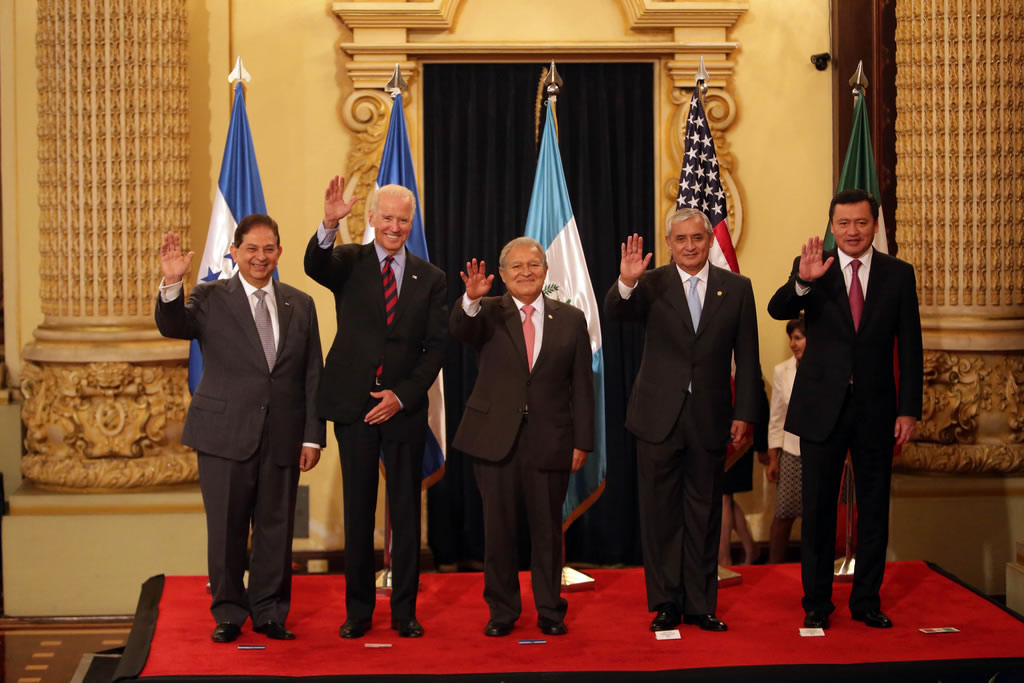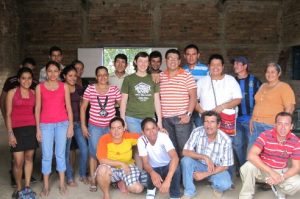Education, Scholarships, Sister Cities
One Billion Dollar “Alliance for Prosperity” a Concerning Prospect
By Catie Johnston
The past year has been an interesting time for those of us who follow US foreign policy with Latin America. Last summer´s spike in child migrants from countries of the Northern Triangle (El Salvador, Honduras, and Guatemala) led to media and political coverage of the area unprecedented since the Central American civil war era in the ‘70s and ‘80s. President Obama directed millions of dollars to these countries and to our border to address the crisis, and then in November announced an executive action to defer deportation for millions of immigrants in the US. El Salvador is part of the US public conscience – for better or for worse – possibly more than ever in the past two decades, and yet, what do we, the American public, really know about what our government´s new interest in this tiny country really looks like?
What we probably don´t know is that yesterday President Obama presented to Congress a request for $1 billion in aid money for the Northern Triangle in what Vice President Joe Biden, together with the presidents of El Salvador, Honduras, and Guatemala, are spearheading as the “Alliance for Prosperity.” If you didn´t read Biden´s introduction to the plan in the New York Times, you can read it here, or you can read the full text of the Plan here. The plan outlines three major areas, applauding all three countries for already taking steps in the right direction in all three areas. The main components are Security, Good Governance, and Improved Investment Climate. It is difficult to know at this point exactly what this plan entails, as the details seem to be fuzzy or altogether absent from your basic Google search. There are parts that seem promising, and others that are extremely concerning, and it is important to know why some parts that sound nice could actually turn out to be yet another terrible blow to these Central American countries.

Security
That Security is the first point on the list is no surprise: Central and North Americans alike seem to agree on the fact that insecurity is the most immediate stumbling block to economic and social advancement. Mr. Biden mentions in his Op-Ed the importance of community police, specialized police training, and youth outreach centers.
The Salvadoran government under FMLN President Sanchez-Cerén has been promoting its own model of community police, promoting greater trust and communication between cops and the population. Under the Salvadoran program, a small number of officers are assigned to a specific neighborhood or area and then visit each home in that neighborhood, giving each individual the officer´s personal contact information, promoting community-based prevention and anonymous crime reporting. It is not clear how US funds would be implemented in this area, but it is encouraging to see US policies mirroring Salvadoran priorities.
Mr. Biden mentions training for specialized police forces, which is perhaps one of the most concerning pieces. The School of the Americas has embodied for many the US “hands off” approach to human rights abuses in Latin America: by training foreign military and police, the US can ensure the implementation of policies and practices that serve their interests, while conveniently washing their hands of the methods used to employ them. US Embassy press officer Molly Sanchez summed it up beautifully in a meeting Sister Cities had at the Embassy last November when she said “We can teach Salvadoran cops good techniques, but it´s not our fault if they take oppressive measures.” While Mr. Biden´s plan has no mention of the School of the Americas, it follows that same model and should be a large red flag to anyone who has studied the history of Latin America.
These specialized police forces are generally seen as outside the normal rule of law – the regular rights supposedly sacred to every individual to fair trial and due process are suspended in the name of mano dura, or the heavy hand of justice. They historically are cited for outrageous human rights abuses, and have often been employed to fight underground wars against civilian population and resistance movements. This is an especially frightening prospective in Guatemala and Honduras, where private security and military police seem to blend into one another in their violent efforts to wipe campesino and indigenous groups out of the way of wealthy land and business owners’ interests.
The Boys and Girls club model, or in El Salvador known as Centros de Alcance, are part of a current initiative of USAID to bring recreational and educational alternatives to youth throughout the country. It´s one of those feel-good initiatives that the Embassy likes to put in the spotlight because it looks a lot like real populist social investment. And while it´s very true that solid research shows that greater access to recreational and artistic activities for youth are deterrents to youth violence and delinquency, feedback on the ground shows mixed feelings about the initiative. The USAID project seems to be not very well thought out, and many of the centers have all but collapsed without sufficient community involvement and investment in the social structure needed to support such centers. Meanwhile, millions of dollars’ worth of guitars and soccer balls are collecting dust and going largely unused. Will Biden´s plan give life to this malnourished project? Or is it just another funding-black-hole?
Good Governance
In this component, leaders of Salvadoran social organizations and Mr. Biden seem to be in agreement: no major social, economic, or political changes will be made without profound tax reform that would result in greater tax revenue from the wealthy and improved governmental transparency so the public – both national and international – can trust that their taxes are being spent appropriately. In fact fiscal reform is one of the top 5 priorities of CRIPDES and the MPR-12, both of which are major pieces of the Salvadoran social movement.
What is concerning in Mr. Biden´s New York Times Op-Ed is that it is Honduras, with its military dictator who stole the presidency in a violent and continuingly repressive take-over, which receives the praise of Vice President Biden, and not El Salvador. El Salvador has taken unprecedented steps towards addressing corruption and transparency in the past 5 years, exemplified in the trial of former president Paco Flores for stealing millions of dollars of aid money during his presidency. For the first time, government officials – despite the size of their bank accounts – are held accountable for their use and misuse of funds and power. And yet it is the Honduran president with his newly-instated military police and denial of access to basic rights for large sectors of the Honduran population while further entrenching the political and real power of narco-traffickers in the country who receives the praise of Mr. Biden?
Improved Investment Climate
Salvadoran President Salvador Sanchez-Cerén has mentioned on many occasions the importance of foreign investment in El Salvador, and yet the ideas on how to create this kind of fertile investment soil are as varied as they are polarized. The kind of language used by Mr. Biden reeks of the Millennium Challenge Corporation, the US aid money that gets funneled into making it easier for foreign companies to have their way with the economy and natural resources of Central American countries. While Biden mentions some components that Sanchez-Ceren and the Salvadoran social movement would agree with – addressing corruption and improving transparency – he also lists off a whole slew of measures that follow the neoliberal trend of protecting corporate rights over people´s rights and countries´ sovereignty.
One item on Biden´s laundry list for improving the investment climate is creating fair courts that offer protections for investors, precisely the kind of court that has enabled the Canadian company Pacific Rim to sue the country of El Salvador for denying permission to exploit gold mines on environmental grounds. Despite overwhelming popular resistance to mining projects, the International Centre for Settlement of Investment Disputes (ICSID), which is part of the World Bank, has been for years now facilitating this bogus lawsuit in which El Salvador is being sued for more than the company is even worth. People within the Social Movement consider that these kinds of courts, which prioritize corporate rights over human and environmental rights, must be liquidated in order for democracy to progress and for national sovereignty to be secured, and yet Mr. Biden is recommending increased influence of these kinds of courts throughout Central America.
A Plan Columbia for Central America
While it is exciting to see so much funding on the table for Central America, many of us who work closely with the populations most affected by these kinds of policies have many concerns. The voice of corporations and big business is very loud, but the voice of the People ought to be louder. Joe Biden concludes his New York Times Op-Ed about the Northern Triangle Alliance for Prosperity with unbridled praise for the successes of Plan Columbia, a US funding package that implemented military and police war on leftist groups and biological warfare on cocaine producers in Columbia in what was originally supposed to be a plan for peace and prosperity for the Columbian people. While the US continues to hail it´s great success, the people see it as another page in the history of repressive foreign policy. The people of El Salvador know the harm caused by many of the kind of initiatives being recommended by Vice President Biden, and yet their voice seems to be absent from this debate. Will we Americans who are owners of the US government stand by and permit this kind of silencing, or will we raise our voices in solidarity?

